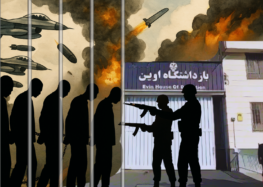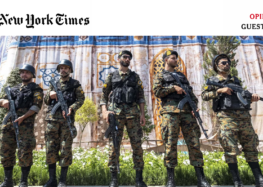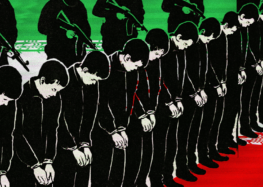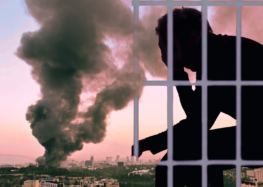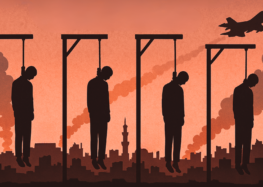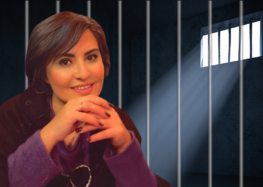Mohammad Javad Larijani Misrepresents Human Rights Council Session on National Television
During an appearance on the Islamic Republic of Iran’s state television this week, Mohammad Javad Larijani repeatedly misrepresented the events of last week’s Human Rights Council session in Geneva. Larijani’s false statements were an attempt to conceal the wide range of objections faced by the Iranian delegation during the session. In his statements, Larijani spoke of Japan’s support for Iran, when in fact, Japan was one of the signatories of the statement by 56 countries that highlighted widespread violations and objected to the situation of human rights in Iran. The statement was read despite Iran’s efforts to stop it.
What facts were misrepresented by Larijani?
1. Larijani said that about 30 of the recommendations made to Iran were rejected by the Iranian delegation because they were “against Iranian laws,” or “because they were disproportionate or contained poor language.” He then stated cases such as Iran’s refusal to join the United Nations Convention Against Torture, stating that Iran doesn’t join the Convention because there are types of punishment in Iran that are considered as torture in the Convention. He added that torture is prohibited in Iran and this is expressed in the Iranian Constitution.
Contrary to Larijani’s statements, there were cases which the Iranian delegation did not accept, deflecting blame by criticizing human rights violations in other countries thereby refusing to address the raised points. At one point, the Head of the Session reminded Larijani that the meeting was to review Iran’s report, not other countries. Those cases included prison torture, specifically, the events that took place at Kahrizak Detention Center, arbitrary and secret executions (such as the execution of Farzad Kamangar), long-term sentences after show trials (such as Jila Baniyaghoub’s 30 year ban from journalism), refusal to grant congregation permits to political parties and opposition groups, and others. Larijani reiterated the government position that the murder of Neda Agha Soltan was committed by foreign agents, stating this claim without any comprehensive investigation into her murder or publication of the results of any such investigations. Many of the points raised in recommendations from other countries are important components of the Iranian Constitution and international commitments of the Iranian government and are routinely violated by the Islamic Republic of Iran. The issues raised by member countries of the UN Human Rights Council did not have poor language, nor were they against the Iranian Constitution, but simply encapsulated the widespread and systematic violations of human rights in Iran, information Larijani tried to conceal during all his speeches. dodging accountability and instead criticizing the situation of human rights in other countries.
2. Larijani said that the main problem is that member countries “view some of our punishments as torture,” such as “flogging.” Disregarding the fact that Larijani claims that flogging is a legitimate form of punishment and not torture, there are numerous other “punishments” Iran should be held accountable for. “Punishments” such as solitary confinement, stoning, the amputation of arms and legs, isolation of prisoners from the outside world including refusing them access to their families, lawyers, and fresh air, and psychological pressure for the extraction of false confessions. Iran’s acceptance of the UN Convention Against Torture would make Iran accountable in these areas, despite attempts to redefine methods of torture as “punishment.”
3. Larijani considers the criticism of “Western countries” as their support for what he calls the “election sedition.” What he calls the “election sedition” is the instances of widespread violations of human rights in the past year, which aside from the related political issues, have never been addressed by the Iranian authorities. The violators, whether they carried out or issued orders, have never been held accountable by the Iranian Judiciary for their actions. Politicizing the criticism against the widespread violations of human rights in no way reduces the responsibility of the Iranian judicial authorities for giving immunity to those who ordered and carried out post-election violence.
4. During his televised statements, Larijani talked about the support Iran was given by dozens of countries. He did not explain that some of the countries that supported Iran such as China, Sudan, or Cuba, are some of the worst violators of human rights themselves. These countries are fearful of the criticism they would face in their own of Human Rights Council sessions and thus oppose all criticism in for other countries. Additionally, Iranian diplomats’ months-long lobbying in order to gain the votes of neighbors and strategic economic or political allies or to have them speak in favor of Iran’s human rights conditions cannot whitewash the reality of widespread violations of human rights in Iran in the past year.
5. Referring to last Tuesday’s events, Larijani used the phrase “the day Iran’s report was approved.” In fact, there is no such action on the Session’s agenda to “approve” any country’s reports. Human Rights Council sessions are composed of a presentation by a country, followed by reports, recommendations, and cases of human rights violations from other countries, NGOs, international organizations, and the UN High Commissioner for Human Rights. The presenting country then responds to the points raised. Again, the countries and/or international organizations express their opinions about the report and the report is closed. The same process took place for Iran’s periodic report and there was no “approval” as Larijani stated.
The difference was that 56 countries, including Japan, sponsored a statement objecting to the situation of human rights in Iran. This clearly demonstrates that contrary to what Larijani claimed, not only was there no positivity about the situation of human rights in Iran, but countries were surprised at Iran’s actions to delay the reading of the report.
Additionally, diplomats from countries whom Iran regards as “friends” explicitly said in several meetings that their decision to abstain from criticizing Iran’s human rights situation was a political decision made by their nation’s governments. Delegates said they are aware of the situation of human rights in Iran and regret their inability to express views opposing their national political positions.
6. When the statement of 56 countries against the situation of human rights in Iran was read last week, the Iranian delegation was completely shocked. The Iranian delegation and several other countries such as Pakistan, Nigeria, Cuba, and Venezuela objected to the reading as soon as Iran’s name was mentioned in the statement. They said that under Article 8, no country’s name should be mentioned in such statements.
In the end, after the report’s reading resumed, Larijani misrepresented the situation again. He distorted the fact that the majority of the objecting countries — who themselves have instances of human rights violations — were objecting because they believed that if the precedent was set to name countries in statements, it is possible that their names would be mentioned in similar statements in the future. Once the head of the session assured them that such a precedent would not be set, those countries practically abandoned Iran.
Larijani even defended “Iran’s stellar human rights record” at the session, when no information has yet emerged from investigations into the 15 June 2009 attack on Tehran University dormitories, the reported mistreatment, abuse, and torture of dozens of detainees at Kahrizak Detention Center which led to at least four deaths, the murders of dozens of protesters in city streets, show trials and television confessions and dozens more instances of clear, widespread, and systematic violations of human rights in Iran over the past year. No violator in any instance has been identified or prosecuted.

